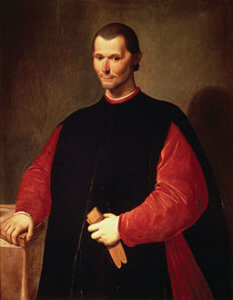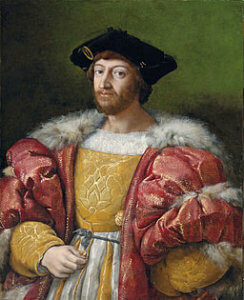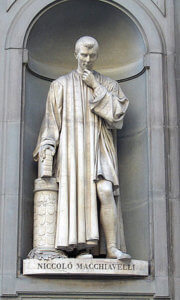
“…it is necessary for a prince who wishes to maintain his position to learn how to be able not to be good, and to use or not use this ability according to circumstances.” 1

These are the words of Niccolo Machiavelli (1469-1527), a former diplomat of the Florentine republic during the early years of the Renaissance. Machiavelli lived through a time of great political upheaval in Italy, a region dominated by a number of large city-states – such as Florence, Venice, Milan and Pisa – that were fiercely competing for economic and political power. While the intense rivalry between these city-states provided the catalyst for a flourishing of artistic and intellectual activity across the region, it also contributed to a politically turbulent environment in which conflict and warfare were common. To survive in these dangerous and tumultuous times, rulers and governments had to use all the resources at their disposal to outmanoeuvre their political rivals and maintain the loyalty of their subjects.
It was against this political backdrop that Machiavelli wrote his now famous work The Prince. It was originally written to gain favour with the Medici family – a rich and powerful banking dynasty – who had taken political control of Florence in 1512. Suspecting Machiavelli of participating in a conspiracy against them, the Medicis ordered his imprisonment and torture before sending him into exile. During his banishment, Machiavelli wrote The Prince as a gift for Lorenzo di Piero de’ Medici – the new ruler of Florence – in an effort to regain his trust. It contained what he regarded as his most valuable possession: his knowledge on how to successfully govern and maintain the security of a state.
Unfortunately for Machiavelli, The Prince did not have the effect on Lorenzo de Medici that he had hoped. However, his treatise on how to wield power successfully – which was published after his death – is now considered one of the great works of Western political philosophy. It has attracted considerable controversy over the years, mainly due to Machiavelli’s advocacy of ruthless and unscrupulous methods to hold and retain power. Indeed, the term “Machiavellian” is often used today in a pejorative sense to describe cunning, scheming and deceitful individuals.
To give you a flavour of Machiavelli’s thought, it is useful to consider a small selection of some of his most notorious pieces of advice in The Prince.
On the Art of War
“A prince [or ruler] must have no other thought or objective, nor dedicate himself to any other art, but that of war with its rules and discipline [….] the quickest way to lose a principality is to neglect the art of war, and the best way of acquiring one is to be a master in this art.” 2

Even during times of peace, Machiavelli urged rulers to always think about and be prepared for war. In particular, he recommended that they read the histories of great men and examine their military victories and defeats so they could imitate the former and avoid the latter. He also suggested that they familiarise themselves with the geographical lay of their land – the mountains, the plains, the valleys and the nature of rivers and marshes. This knowledge had two uses: it would help them devise strategies to defend their territory effectively, and prepare them for launching an attack on foreign soil where similar terrains could be found.
A leader who did not take the time to study and understand military matters, he warned, would never be able to command the respect of their army. Nor would they be able to trust their soldiers, some of whom may harbour aspirations for power.
On Human Nature
“…it can be said of men that they are ungrateful and inconstant, simulators and dissimulators and that they are hungry for profit and quick to evade danger. While you do them good they are devoted to you, offering their lives, their possessions, their children, as I have said before – but only as long as danger is far off. The moment danger is at hand, they turn away. A Prince [or ruler] who has based everything on their word without taking other precautions is ruined…” 3
In addition to being an expert in the art of warfare, Machiavelli argued that a ruler would need to be skilled in the art of government to cultivate the broad support of their populace. This, he believed, was only achievable if a ruler had first developed a realistic understanding of human nature based on a careful assessment of how their subjects actually behaved, and not how they ought to behave. Machiavelli’s own observations and political experience had led him to believe that people could be fickle, selfish, easily corrupted and cowardly, and if a ruler believed otherwise this would likely end in their ruin. In his view, rulers needed to find ways to channel the behaviours of their subjects – both good and bad – in a way that could benefit the security and stability of their state. This would require a range of techniques including deception, manipulation, the use of punishment and reward, and even, at times, outright cruelty.
On Deception
“Of course, it is best to both seem and be merciful, loyal, humane, upright and scrupulous. And yet one’s spirit should be calculated in such a way that one can, if need be, turn one’s back on these qualities and become the opposite.” 4
While Machiavelli believed that it was commendable for a person to conduct themselves with honesty and integrity, he did not believe this was the wisest course of action for a ruler. For when surrounded by people who would readily deceive, cheat and lie in an effort to gain power, acting with complete moral integrity could place a ruler at a disadvantage, potentially compromising their position and the security of their state. The key, Machiavelli argued, was to appear to possess superior moral virtues while secretly being able to turn one’s back on these qualities whenever the situation required. He observed that this task was made possible by the fact that people were easily deceived; they tended to be convinced by outward appearances rather than actual behaviours and deeds. As long as a ruler achieved successful outcomes for their people while projecting an image of integrity, he noted their methods would rarely be questioned by the public at large.
On Punishment and Reward
“When someone does something in civil life that is extraordinarily good or bad the prince should find a way to reward or punish this person that will be much talked about.” 5
To Machiavelli, the ideal situation was for a ruler to be loved and feared in equal measure as this powerful mix of emotions would make it more difficult for their political rivals to rise up against them. However, when a combination of fear and love could not be achieved, Machiavelli observed that it was always better for a ruler to be feared than loved. This was because people would be much less likely to cause harm when the threat of a dreadful punishment loomed large. On this basis, Machiavelli advised rulers to find methods of punishment that would become newsworthy so that all their subjects would soon learn not to cross them. Conversely, rewards for good behaviour should be ostentatious so that people were incentivised to act in their ruler’s interests. However, Machiavelli added a word of caution to this advice: a ruler had to be careful not to let fear of their rule slip into outright hatred. For the latter emotion would only work against them by sparking in their subjects a desire for revenge. In particular, he counselled rulers against seizing the property of their citizens, for this was an act that would never be forgiven.
On the Use of Cruelty
“[A ruler] must not fear being reproached for cruelty when it is a matter of keeping his subjects united and loyal, because with a few exemplary executions he will be more merciful than those who, through too much mercy, allow the kind of disorder to spread that gives rise to plunder and murder. This harms the whole community, while an execution ordered by a prince harms only a single individual.” 6
Machiavelli advocated the use of cruelty, but only sparingly and in situations where it was necessary for a ruler to secure power and maintain order amongst their citizens. He took the utilitarian view that a small amount of cruelty inflicted on a few was an acceptable course of action if it was done for the benefit of the greater number. However, he noted that if cruelty was used often, this would likely end in ruin as the populace would inevitably rise up against their ruler, leading to their eventual demise.
Machiavelli: An amoral thinker or an arch realist?
It is not difficult to see from this small selection of quotes why Machiavelli’s work has attracted so much controversy over the years. By encouraging rulers to use ruthless, manipulative and unscrupulous techniques to maintain their power and the security of their state, Machiavelli had positioned himself in direct conflict with the teachings of the Catholic Church. In particular, his suggestion that rulers could turn their backs on Christian moral values as and when necessary was the cause of widespread outrage and consternation, leading to the Pope banning The Prince in 1559.

This sense of unease with Machiavelli’s work has continued in the centuries following his death, with various writers branding him an amoral thinker, “a teacher of evil” and even “a partner of the Devil”. Such attacks on his character, however, do not do justice to the complexity of his thought. For Machiavelli was not against the adoption of moral values per se. In fact, he thought it commendable for the common man to strive to act with honesty, generosity, and integrity in their everyday actions. Rather, his argument was that we could not realistically expect our rulers to submit to the same moral standards, when their priority was to safeguard the well-being of the state. As far as Machiavelli was concerned, this was simply about being realistic – it was about seeing and dealing with the world as it really was, and not being distracted by religious or utopian visions of how we wished it could be. And in the real world, he argued, an upright and virtuous ruler would quickly come into trouble when faced with political rivals who were willing to do whatever was necessary to gain power. Moreover, their strict observation of moral principles could end up doing more harm than good to their citizens by making their state vulnerable to attack – an outcome that would likely lead to chaos, disorder and violence.
By simply dismissing Machiavelli’s work as immoral, we avoid engaging with the important, yet uncomfortable questions his philosophy poses: Is the security and wellbeing of our state more important than the personal morality of our leaders? Can immoral actions ever be justified if they produce beneficial outcomes for society as a whole? And if Machiavelli is right, and we are forced to choose: would we prefer to live in a weak and vulnerable state led by a virtuous and upright leader, or a strong and secure state ruled by one who will do whatever is necessary to protect our way of life?
Further Resources
While The Prince was originally written during the 16th century Renaissance period, its contents remain remarkably applicable to an understanding of modern politics today. We should warn you, however, that the book does make for some uncomfortable reading given Machiavelli’s casual abandonment of conventional moral principles. Despite this, anyone who has held a position of influence, either in politics or business, is likely to recognise some of Machiavelli’s observations of human behaviour and indeed may even empathise with some of his advice to leaders.
To complement your reading of this important work, we would also recommend The Proper Study of Mankind, a collection of essays by Isaiah Berlin, in which he summarises and dissects Machiavelli’s thought. The BBC radio programme In Our Time has also produced this excellent episode on Machiavelli and the Italian City States – it is well worth a listen.
You can also find further video resources on this topic at our Mind Attic YouTube channel playlist

